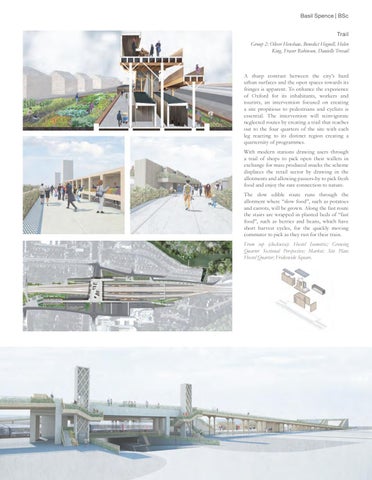Basil Spence | BSc Trail Group 2: Oliver Henshaw, Benedict Hignell, Helen King, Fraser Robinson, Danielle Trevail
A sharp contrast between the city’s hard urban surfaces and the open spaces towards its fringes is apparent. To enhance the experience of Oxford for its inhabitants, workers and tourists, an intervention focused on creating a site propitious to pedestrians and cyclists is essential. The intervention will reinvigorate neglected routes by creating a trail that reaches out to the four quarters of the site with each leg reacting to its distinct region creating a quarternity of programmes. With modern stations drawing users through a trail of shops to pick open their wallets in exchange for mass produced snacks the scheme displaces the retail sector by drawing in the allotments and allowing passers-by to pick fresh food and enjoy the rare connection to nature. The slow edible route runs through the allotment where “slow food”, such as potatoes and carrots, will be grown. Along the fast route the stairs are wrapped in planted beds of “fast food”, such as berries and beans, which have short harvest cycles, for the quickly moving commuter to pick as they run for their train. From top (clockwise): Hostel Isometric; Growing Quarter Sectional Perspective; Market; Site Plan; Hostel Quarter; Frideswide Square.
